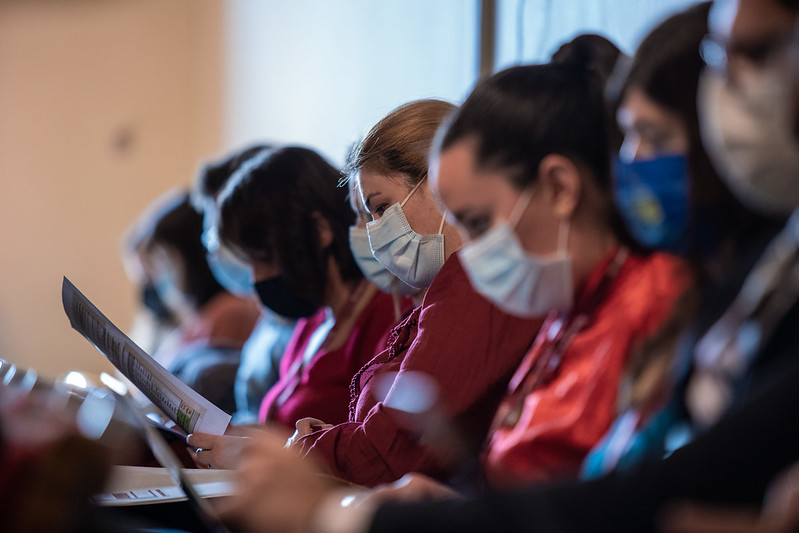Study By VU Researchers Shows Contrasting Conceptions of Education Quality, Recommendations Also Offered to Ministry
 Vilnius University (VU) researchers have found that conceptions of education in the Lithuanian public differ the most in terms of its goals and the means of achieving them. The researchers formulated their key conclusions and presented them at the Ministry of Education, Science and Sports of the Republic of Lithuania.
Vilnius University (VU) researchers have found that conceptions of education in the Lithuanian public differ the most in terms of its goals and the means of achieving them. The researchers formulated their key conclusions and presented them at the Ministry of Education, Science and Sports of the Republic of Lithuania.
The VU researchers, namely Irena Stonkuvienė and Agnė Juškevičienė, both associate professors at the Institute of Educational Sciences, and Simonas Šabanovas, an educator, PhD of social sciences, and lecturer at VU, conducted a comparative study to determine how the quality of education is understood by different groups participating in the education process, viz. parents, teachers, school administration, and employers. The study has shown that respondents from the respective groups have very contrasting attitudes on what quality education consists in.
Economic and humanist approaches
There have been many attempts to define quality education. Some of these definitions tend to underscore the quantitative, measurable results, which is indicative of the economic approach to education, while others focus more on the process of education itself, i.e. what is happening during lessons and in schools, which is reflective of the humanist tradition of education.
According Stonkuvienė, the study found that although the humanist approach is the dominant one and reflects the expectations of teachers, parents, and employers alike, the reality is rather different, with the economic approach applied more extensively. It turns out that parents and employers do not even mention PISA or VBE scores, which are of so much importance to those working in the field of education.
‘The problem here is that even having agreed on the key elements of education quality such as its goals, the education process participants focus their efforts in different directions. For a long time now, the declared education paradigm we are supposed to be following has been the humanist one, which has continuously received criticism and is now supposed to be put under review. However, the value-based position and the actions on the ground would go separate ways: One declares one thing and measures something else,’ Stonkuvienė says.
The study also highlighted the fact that in contrast to the public perception, employers lean more towards the humanist approach and prioritize graduates with creative and critical thinking skills and innovative education practices.
Another aspect that came as a surprise to the researchers was a highly positive attitude among parents to teachers. This is the opposite of what earlier studies or the public discourse seem to suggest. ‘One factor here, in our view, could have been the pandemic situation, with parents having an actual chance to see how teachers work and the effort they put into getting their children interested, etc.,’ Stonkuvienė said, adding, however, that parents also emphasize another aspect, namely the teachers’ qualifications.
The VU researchers stress the need for close cooperation between all participants in the education process, i.e. parents, schools, and prospective employers.
Recommendations offered
The researchers presented a set of recommendations to the Ministry of Education, Science and Sports, suggesting it to consider more closely the conception of education quality and its practicability.
‘The study has found that different societal groups view the current system of education as poor and often tend to focus on one aspect of education quality above all others. The most significant differences came to light in the answers of employers on the one hand and teachers on the other. This is why we recommend encouraging discussions between parents, employers, and teachers and getting them involved in shaping and implementing the education policy. In addition, one should rethink the activities within the education process, giving the central role to collaborative learning and also providing the conditions for pupils to study what they are interested in,’ Šabanovas says.
The researchers recommend to base the content of education programmes on three concepts, namely interdisciplinarity, integrity, and experiential learning. Another recommendation is to direct international research exclusively towards monitoring the situation on the national level and model education processes in terms of national assessments of pupils’ progress. And these should be treated not as assessments, but as a means of helping with pupils’ individual progress.
The researchers suggest preparing a long-term, personalized system of assessment that is oriented to individual needs of pupils. They emphasize that the key here is not standards themselves but rather the progress pupils make. In addition, school infrastructure and resources should be oriented towards two goals, namely of encouraging pupils’ creativity and collaboration.
According to the researchers, the professional development of teachers should be organized in a timely manner and directed towards consistently improving the process of education, which would require creating a simple and swift system that reflects individual professional needs of teachers.
Juškevičienė also offered some insight and urged to consider more closely the conception of education quality and its practicability: ‘The quality of education could be improved by learning from one’s peers, by facilitating consistent, timely, and situation-based professional development of teachers, by targeting school infrastructure and resources towards encouraging pupils’ creativity and collaboration, and by directing international research on pupils’ results exclusively towards monitoring the situation on the national level, putting more emphasis on researching national assessments of pupils’ progress.’